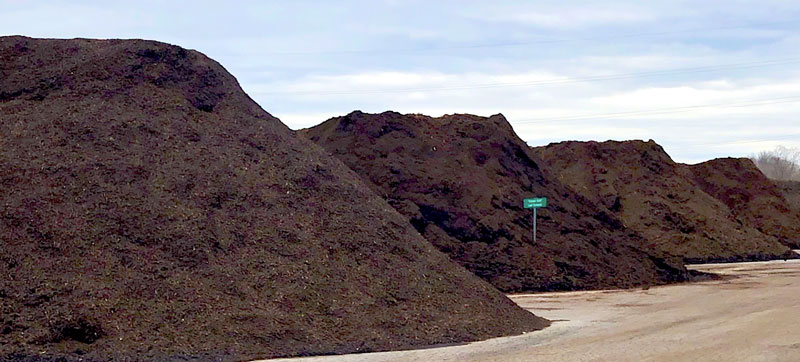Top: Financial assurances apply to all solid waste management facilities, including composting operations. Photo by Nora Goldstein
Craig Coker
When my business partners and I decided to start Star City Compost in our hometown of Roanoke, Virginia to collect and recycle food scraps by composting, we decided to get a permit from Virginia’s Department of Environmental Quality (DEQ). DEQ administers the Virginia Solid Waste Management Regulations, which require that composting facilities handling regulated solid wastes (like food scraps) get a permit to do so. This is a common requirement in all U.S. states. Some readers may ask why we bothered to get a permit; not only is it required by law, but commercial and institutional customers will often look for full and unscarred regulatory compliance during their due diligence assessments.
Another commonality among all states is the need to demonstrate financial assurance for solid waste management facilities in the event they are abandoned, requiring the state government to step in to close the facility and perform any needed environmental remediation. Many perceive that financial assurance is only applicable to landfills because of their potential for long-term environmental liability, however these assurance requirements apply to all solid waste management facilities.
The steps we had to follow for Star City Compost are also common to most states: prepare a closure cost estimate certified by a Professional Engineer (P.E.) and post a financial instrument that conforms to the permissible forms of financial instruments spelled out in state regulations. Closure cost estimates are built around the premise that a facility is abandoned and that the owners cannot be located. The state would hire a third-party contractor to remove — and dispose of properly — any regulated solid wastes on-site and any stored contact or pathogen-contaminated storm water. The contractor would also remove all equipment and clean up the site. Financial assurance is designed to provide funds to pay for these contractors.
History of Financial Assurance
When Congress passed the Resource Conservation and Recovery Act (RCRA) in 1976, the act included a requirement to ensure that adequate funds would be available to close waste management facilities properly, care for them after closure, undertake necessary corrective action, and compensate for releases from those facilities. The statutory financial responsibility requirements are intended to force owners and operators of waste management facilities to recognize and “internalize” the costs of third-party liability and site closure, post-closure, and cleanup so that public funds would not have to be called upon to cover them. A number of federal environmental statutes employ similar financial responsibility standards. (Turner, 1998).
When EPA started to codify RCRA into regulations, the agency decided to start with “Subtitle C” hazardous waste treatment, storage, and disposal facilities. When the final Subtitle C regulations were issued in 1992, owners and operators could satisfy financial responsibility requirements by several different mechanisms (or a combination thereof). These included establishing a trust fund; obtaining a surety bond from a company listed as acceptable in U.S. Treasury Circular 570; obtaining an irrevocable standby letter of credit from a state or federally “regulated and examined” institution (i.e., a bank); purchasing insurance from an insurance or surplus lines company; or “self-insurance” (i.e., a financial test) if certain financial criteria could be satisfied.
In 1988, the EPA proposed regulations to implement Subtitle D of RCRA by drafting design and operating requirements for non-hazardous municipal solid waste landfills as well as to provide financial assurance for closure, post-closure care, and corrective action. The 1991 final federal Subtitle D regulation included several specific financial assurance demonstration mechanisms (trust fund, surety bond guaranteeing payment or performance, letter of credit, insurance, state-approved mechanisms, and state assumption of responsibility). Subsequent amendments included local government financial guarantees and corporate “self-insurance.” It is these federal Subtitle D regulations that have been built into state solid waste management regulations.
Virginia Requirements
In Virginia, the financial assurance for closure cost regulations allow for the following permissible financial instruments: a trust fund; a surety bond guaranteeing payment or performance; a letter of credit; a certificate of deposit (CD); insurance; a corporate financial test; a local government financial test; a corporate guarantee; a local government guarantee; and combinations of those specific options.
At Star City Compost, our P.E.-certified closure cost estimate is $7,735, which also includes the cost for a P.E. to sign off on the proper closure of our site. We did not qualify for a surety bond or a bank letter of credit as we were a young company with no financial track record. We could not find an insurance policy, as the known costs of closure are not considered to be amenable to standard insurance policy writing practices. Policies are generally written to cover losses that may or may not occur — not known costs. To conform to the regulations regarding corporate financial test or guarantee, we had to demonstrate a net financial worth of $10 million.

Star City Compost in Roanoke, Virginia, collects and composts food scraps. It established a closure trust fund at a local bank to comply with the state’s financial assurance requirement.
The only recourse was a CD or a DEQ-approved trust fund. If we posted a CD for the closure costs, DEQ would require a funded stand-by trust fund, which seemed to us to be a “belt-and-suspenders” option. Why require a funded stand-by trust fund if you put up the cash in a CD? In Virginia, DEQ only accepts closure trust funds from a few banks, one of which I have accounts with, so that was the route we chose. We put $7,735 in that bank, they got the trust fund approved by DEQ, and we got our operating permit for the composting facility, which allowed us to start picking up food scraps from our subscribers on January 2 of this year. As I was an existing customer of that bank, they waived the $1,000 initiation fee but not the $2,500 annual maintenance fee.
If these requirements seem overly burdensome to a young composting company, I would agree. These requirements may be contributing to the reluctance of some small-scale composters to obtain required state permits. However, as Star City Compost is interested in providing food scrap recycling services to commercial and institutional clients, and as those potential customers will do their due diligence on our regulatory compliance status, complying with the Virginia Solid Waste Management regulations was not optional. This is just a cost of doing business.
Craig Coker is co-owner of Star City Compost LLC in Roanoke VA, a senior editor at BioCycle Connect, and CEO of Coker Composting and Consulting. He can be reached at ccoker@cokercompost.com.














